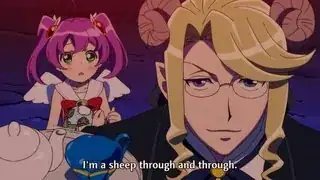Yeah, it's a pun. When read
悪魔で執事ですから
akuma de shitsuji desu kara
It means
I'm a devil and a butler, you see.
Whereas, when read as the identical-sounding
飽くまで執事ですから
aku made shitsuji desu kara
It means
I'm a butler through and through, you see.
This pun (aku made vs. akuma de) is a relatively common one in Japanese. For an example of a second-order pun of this variety, see the omake at the end of episode 26 of Yowamushi Pedal:

The fellow on the right was transformed from being a sheep to a (human) butler, and so instead of saying aku made shitsuji desu kara "I'm a butler through and through", he says aku made hitsuji desu kara "I'm a sheep through and through" (butler = shitsuji, sheep = hitsuji; cf. What do the sheep dolls represent in Mayo Chiki?).
Additional note: the aku in the two examples are homophones that mean different things. The aku in my first example is 悪, which means "evil". The aku in my second example is 飽く, which is a verb meaning "to grow tired of" (you see its more common synonym 飽きる = akiru more often).
The compound construction aku made (飽くまで) means "until I grow tired of ~" when viewed as two different words, and means "completely" or "thoroughly" when viewed as a fixed idiomatic compound (this latter usage is standard; analyzing it as a verb+まで is not).
The official English translation by Funimation aptly captures the meaning and magnitude of this pun by translating it as "You see, I'm merely one hell of a butler." This reflects both his demonic nature as well as his skills as a servant using a common English expression that has more or less the same meaning.
